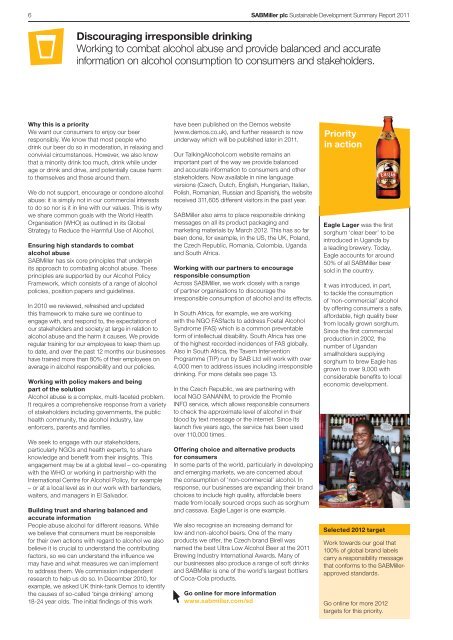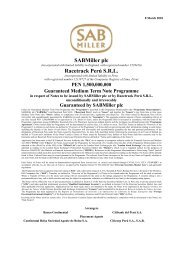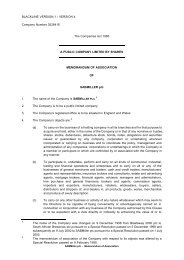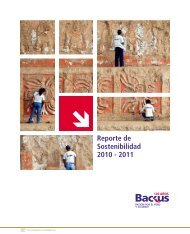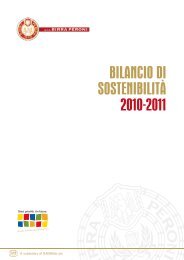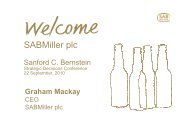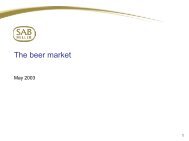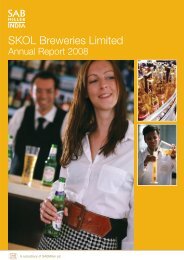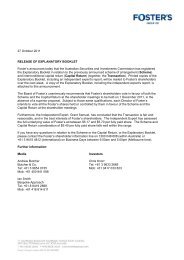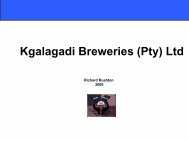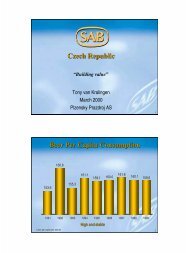Download the Sustainable Development Summary ... - SABMiller
Download the Sustainable Development Summary ... - SABMiller
Download the Sustainable Development Summary ... - SABMiller
Create successful ePaper yourself
Turn your PDF publications into a flip-book with our unique Google optimized e-Paper software.
6 <strong>SABMiller</strong> plc <strong>Sustainable</strong> <strong>Development</strong> <strong>Summary</strong> Report 2011<br />
Discouraging irresponsible drinking<br />
Working to combat alcohol abuse and provide balanced and accurate<br />
information on alcohol consumption to consumers and stakeholders.<br />
Why this is a priority<br />
We want our consumers to enjoy our beer<br />
responsibly. We know that most people who<br />
drink our beer do so in moderation, in relaxing and<br />
convivial circumstances. However, we also know<br />
that a minority drink too much, drink while under<br />
age or drink and drive, and potentially cause harm<br />
to <strong>the</strong>mselves and those around <strong>the</strong>m.<br />
We do not support, encourage or condone alcohol<br />
abuse: it is simply not in our commercial interests<br />
to do so nor is it in line with our values. This is why<br />
we share common goals with <strong>the</strong> World Health<br />
Organisation (WHO) as outlined in its Global<br />
Strategy to Reduce <strong>the</strong> Harmful Use of Alcohol.<br />
Ensuring high standards to combat<br />
alcohol abuse<br />
<strong>SABMiller</strong> has six core principles that underpin<br />
its approach to combating alcohol abuse. These<br />
principles are supported by our Alcohol Policy<br />
Framework, which consists of a range of alcohol<br />
policies, position papers and guidelines.<br />
In 2010 we reviewed, refreshed and updated<br />
this framework to make sure we continue to<br />
engage with, and respond to, <strong>the</strong> expectations of<br />
our stakeholders and society at large in relation to<br />
alcohol abuse and <strong>the</strong> harm it causes. We provide<br />
regular training for our employees to keep <strong>the</strong>m up<br />
to date, and over <strong>the</strong> past 12 months our businesses<br />
have trained more than 80% of <strong>the</strong>ir employees on<br />
average in alcohol responsibility and our policies.<br />
Working with policy makers and being<br />
part of <strong>the</strong> solution<br />
Alcohol abuse is a complex, multi-faceted problem.<br />
It requires a comprehensive response from a variety<br />
of stakeholders including governments, <strong>the</strong> public<br />
health community, <strong>the</strong> alcohol industry, law<br />
enforcers, parents and families.<br />
We seek to engage with our stakeholders,<br />
particularly NGOs and health experts, to share<br />
knowledge and benefit from <strong>the</strong>ir insights. This<br />
engagement may be at a global level – co-operating<br />
with <strong>the</strong> WHO or working in partnership with <strong>the</strong><br />
International Centre for Alcohol Policy, for example<br />
– or at a local level as in our work with bartenders,<br />
waiters, and managers in El Salvador.<br />
Building trust and sharing balanced and<br />
accurate information<br />
People abuse alcohol for different reasons. While<br />
we believe that consumers must be responsible<br />
for <strong>the</strong>ir own actions with regard to alcohol we also<br />
believe it is crucial to understand <strong>the</strong> contributing<br />
factors, so we can understand <strong>the</strong> influence we<br />
may have and what measures we can implement<br />
to address <strong>the</strong>m. We commission independent<br />
research to help us do so. In December 2010, for<br />
example, we asked UK think-tank Demos to identify<br />
<strong>the</strong> causes of so-called ‘binge drinking’ among<br />
18-24 year olds. The initial findings of this work<br />
have been published on <strong>the</strong> Demos website<br />
(www.demos.co.uk), and fur<strong>the</strong>r research is now<br />
underway which will be published later in 2011.<br />
Our TalkingAlcohol.com website remains an<br />
important part of <strong>the</strong> way we provide balanced<br />
and accurate information to consumers and o<strong>the</strong>r<br />
stakeholders. Now available in nine language<br />
versions (Czech, Dutch, English, Hungarian, Italian,<br />
Polish, Romanian, Russian and Spanish), <strong>the</strong> website<br />
received 311,605 different visitors in <strong>the</strong> past year.<br />
<strong>SABMiller</strong> also aims to place responsible drinking<br />
messages on all its product packaging and<br />
marketing materials by March 2012. This has so far<br />
been done, for example, in <strong>the</strong> US, <strong>the</strong> UK, Poland,<br />
<strong>the</strong> Czech Republic, Romania, Colombia, Uganda<br />
and South Africa.<br />
Working with our partners to encourage<br />
responsible consumption<br />
Across <strong>SABMiller</strong>, we work closely with a range<br />
of partner organisations to discourage <strong>the</strong><br />
irresponsible consumption of alcohol and its effects.<br />
In South Africa, for example, we are working<br />
with <strong>the</strong> NGO FASfacts to address Foetal Alcohol<br />
Syndrome (FAS) which is a common preventable<br />
form of intellectual disability. South Africa has one<br />
of <strong>the</strong> highest recorded incidences of FAS globally.<br />
Also in South Africa, <strong>the</strong> Tavern Intervention<br />
Programme (TIP) run by SAB Ltd will work with over<br />
4,000 men to address issues including irresponsible<br />
drinking. For more details see page 13.<br />
In <strong>the</strong> Czech Republic, we are partnering with<br />
local NGO SANANIM, to provide <strong>the</strong> Promile<br />
INFO service, which allows responsible consumers<br />
to check <strong>the</strong> approximate level of alcohol in <strong>the</strong>ir<br />
blood by text message or <strong>the</strong> internet. Since its<br />
launch five years ago, <strong>the</strong> service has been used<br />
over 110,000 times.<br />
Offering choice and alternative products<br />
for consumers<br />
In some parts of <strong>the</strong> world, particularly in developing<br />
and emerging markets, we are concerned about<br />
<strong>the</strong> consumption of ‘non-commercial’ alcohol. In<br />
response, our businesses are expanding <strong>the</strong>ir brand<br />
choices to include high quality, affordable beers<br />
made from locally sourced crops such as sorghum<br />
and cassava. Eagle Lager is one example.<br />
We also recognise an increasing demand for<br />
low and non-alcohol beers. One of <strong>the</strong> many<br />
products we offer, <strong>the</strong> Czech brand Birell was<br />
named <strong>the</strong> best Ultra Low Alcohol Beer at <strong>the</strong> 2011<br />
Brewing Industry International Awards. Many of<br />
our businesses also produce a range of soft drinks<br />
and <strong>SABMiller</strong> is one of <strong>the</strong> world’s largest bottlers<br />
of Coca-Cola products.<br />
Go online for more information<br />
www.sabmiller.com/sd<br />
Priority<br />
in action<br />
Eagle Lager was <strong>the</strong> first<br />
sorghum ‘clear beer’ to be<br />
introduced in Uganda by<br />
a leading brewery. Today,<br />
Eagle accounts for around<br />
50% of all <strong>SABMiller</strong> beer<br />
sold in <strong>the</strong> country.<br />
It was introduced, in part,<br />
to tackle <strong>the</strong> consumption<br />
of ‘non-commercial’ alcohol<br />
by offering consumers a safe,<br />
affordable, high quality beer<br />
from locally grown sorghum.<br />
Since <strong>the</strong> first commercial<br />
production in 2002, <strong>the</strong><br />
number of Ugandan<br />
smallholders supplying<br />
sorghum to brew Eagle has<br />
grown to over 9,000 with<br />
considerable benefits to local<br />
economic development.<br />
Selected 2012 target<br />
Work towards our goal that<br />
100% of global brand labels<br />
carry a responsibility message<br />
that conforms to <strong>the</strong> <strong>SABMiller</strong>approved<br />
standards.<br />
Go online for more 2012<br />
targets for this priority.


